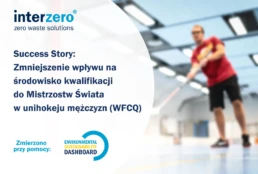Reducing the environmental impact of the World Floorball Championship Qualifiers (WFCQ)

Introduction: In recent years, the global conversation on sustainability has intensified, prompting organisations around the world to assess their impact on the environment. Leading the way, our team undertook a comprehensive environmental impact assessment of the Men's Floorball World Championship Qualifiers (WFCQ). Using Interzero's Environmental Sustainability Dashboard (ESD), we embarked on a journey to assess and reduce the carbon footprint of this major sporting event. Context: The Men's Floorball World Championship Qualifiers (WFCQ) took place in Škofja Loka, Slovenia, from January 31 to February 4, 2024. It involved 5 teams from Slovenia, Belgium, Switzerland, Italy, and Denmark, as well as representatives from the International Floorball Federation (IFF). A total of 216 people, including players and staff, 2,453 visitors, 33 volunteers, and local labour, took part in the tournament.
Challenge: Carbon Footprint of WFCQ Venue
The challenge was clear: how could we ensure that the men's WFCQ, while still being an exciting display of athleticism and sportsmanship, would also be in line with our commitment to sustainability? Considering the many dimensions involved, including venue operations, transport logistics, communication activities, exhibition preparation, accommodation and catering, the task was daunting. However, armed with a dedicated team and our Environmental Sustainability Dashboard, we rose to the challenge. The WFCQ was held at the Poden Arena, located in Škofja Loka (Slovenia) for the entire duration of the event.

For the purpose of calculating the greenhouse gas emissions associated with a facility, the following impact categories were considered:
- Stationary fuel combustion.
- Overall electricity consumption.
- Heat/cold consumption in the network.
- Water consumption.
- Waste disposal.
Solution: Our methodology was rooted in the principles of Life Cycle Assessment (LCA), ensuring that every aspect of the event was meticulously examined for its environmental impact. From quantifying greenhouse gas emissions to assessing waste generation and transportation. Using the Environmental Sustainability Dashboard, we were able to collect and analyse data from a variety of sources, in line with internationally recognised standards such as the Global Reporting Initiative (GRI).
Results: The results of our analysis were both informative and useful. With a total carbon footprint of 108.1 tonnes of CO2 equivalent, we gained valuable insight into where our efforts could make the most difference. Transportation emerged as the most impactful dimension, accounting for 52% of the event's carbon footprint, primarily due to air travel. Accommodation and catering followed, each contributing significantly to the overall emissions. Armed with this knowledge, however, we didn't stop at just assessing. Instead, we proposed targeted strategies to reduce the environmental impact. From promoting sustainable travel options for attendees to optimising venue energy use and minimising waste generation, every mitigation measure was guided by our commitment to sustainability. By the end of the Men's WFCQ, we had not only achieved our goal of quantifying the event's environmental impact, we had also demonstrated our unwavering commitment to sustainability. Through collaborative efforts and innovative solutions, we transformed the sporting event into a beacon of environmental responsibility, setting a new standard for future championships around the world. In summary, the success of our sustainability initiative for the men's WFCQ is a testament to the power of data-driven decision-making and collective action. Looking to the future, we remain committed to further sustainability efforts, ensuring that future generations can enjoy the thrill of sport without compromising the health of our planet.
What is the Environmental Sustainability Dashboard?
The Environmental Sustainability Dashboard (ESD) is Interzero's solution to help clients integrate sustainability into their business strategy. ESD consists of several steps, starting from context analysis and ending with the creation of a Sustainability Action Plan. A key element among these steps is the ESD tool, a web-based platform designed to help companies calculate the different environmental, social and governance impacts related to their core business and/or products. The impact assessment takes into account different dimensions, such as emissions, energy, materials, water and waste. A wide range of Key Performance Indicators (KPIs) can be calculated, such as greenhouse gas emissions or carbon footprint. For each dimension, specific data is required to calculate the appropriate set of results. Both input and output data are selected and generated based on commonly used standards, such as the Global Reporting Initiative, and literature. The output information can be used not only for communication purposes, but also for technical assessment and can be integrated by the company into its sustainability report. ESD is suitable for companies of all sizes, whether they offer services or products.